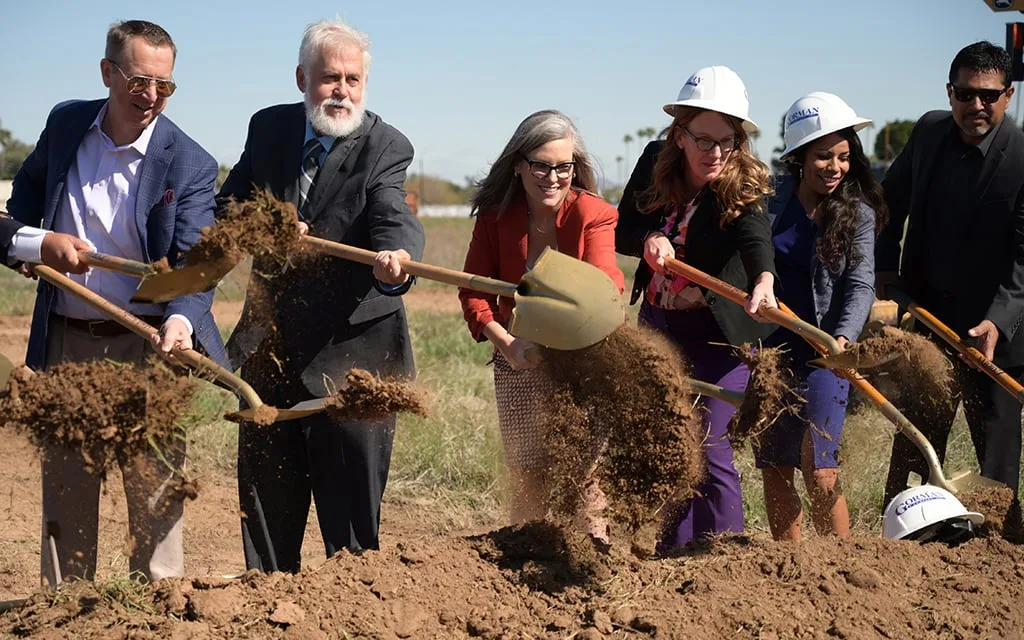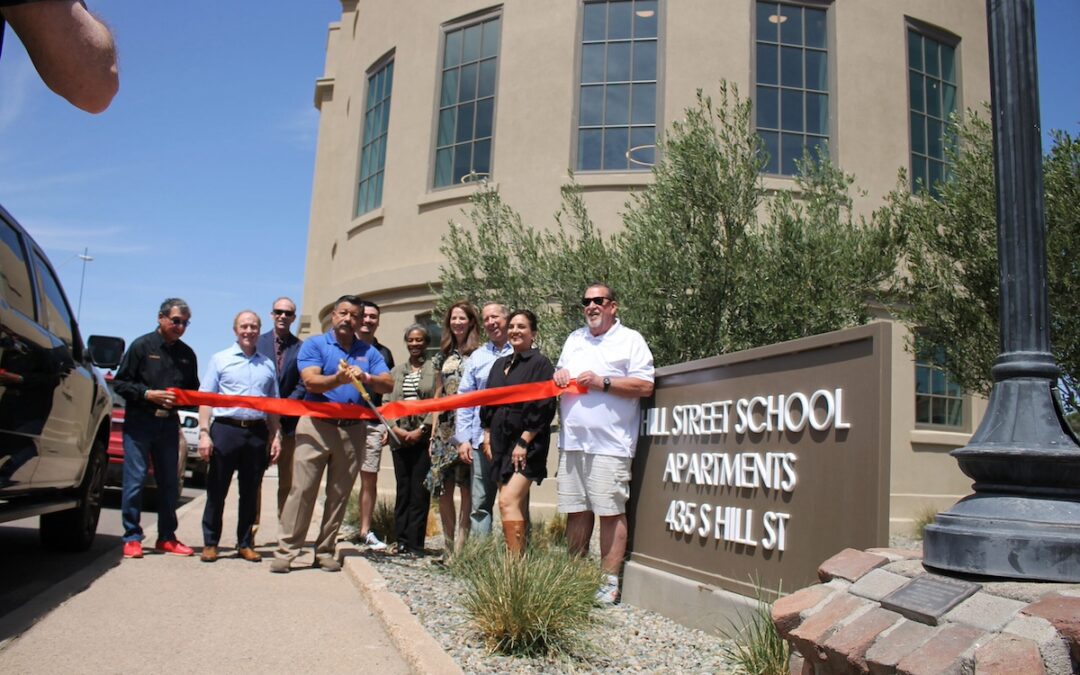
Officials attend the groundbreaking ceremony for Centerline on Glendale, a 368-unit complex designed for mixed-income housing and funded in part by a state low-income housing tax credit. Photo taken on March 24, 2023. (Photo by Izabella Hernandez/Cronkite News)
Katie Hobbs is the first governor in the country to veto legislation that removes zoning restrictions in an attempt to lower the cost of housing – but she still promises to address Arizona’s affordable housing crisis.
The Arizona Starter Homes Act, or House Bill 2570, was a bipartisan piece of legislation that would have increased the housing supply in Arizona and decreased costs for renters and buyers.
In her veto letter, Hobbs wrote that she supports other efforts to reach “a more balanced solution on other reforms,” such as:
- Allowing zoning exceptions for accessory dwelling units (ADUs), like guest houses or casitas, that residents of single-family homes can rent out
- “Middle housing,” or multi-family units that aren’t sprawling apartment complexes, like duplexes or townhome communities
- Repurposing commercial buildings, like unused motels or business parks for residential use
- Streamlining local approval for developments that often slows development leads to a bottleneck in available housing supply
While some cities have implemented these policies at a local level, there are a few bills that would take measures like these statewide. Here’s where proposals aimed at tackling housing affordability are making their way through the legislature:
Senate Bill 1415, would require certain municipalities to adopt policies that allow the development of backyard casitas, or accessory dwelling units (ADUs) on land where single-family homes are allowed.
Backyard casitas are fully functioning smaller homes that are on the same lot but detached from a larger home. These rentals provide more low-cost options for renters, provide an additional income source for homeowners, have proven to increase property value, and often house multi-generational families.
Phoenix, Tucson, and Tempe are a few cities that have legalized casitas for residential use – facing pushback from many homeowners in the past due to the use of casitas for short-term rentals, like Airbnb and Vrbo, which SB1415 does not ban.
The Phoenix City Council passed regulations on short-term rentals in 2023, including making it difficult for them to be used as short-term rentals, but SB1415 would preempt Phoenix’s ordinance.
House Bill 2721, would make it easier to build “missing middle” homes such as duplexes, triplexes, and townhomes in areas zoned for single-family homes, and prevent municipalities from tacking on extra costs, fees, or delays.
But, these types of high-density homes are prime for “not in my backyard” or “NIMBY” opposition.
Pushback comes from residents living in an area with proposed multifamily and affordable housing projects projecting their concerns such as decreased housing values, increased density, crime, traffic, and an idea of who is living in the housing. However, an eight-year study by the University of Utah of neighborhoods in Salt Lake City that loosened zoning regulations to allow for more multifamily housing found these concerns to be largely without merit.
House Bill 2734, would streamline the process of home-building by mandating that municipalities hold a maximum of two public hearings on residential zoning ordinances, which still provides time for adequate public involvement and feedback.
Some cities have drawn out approval processes, such as such as Tucson, Phoenix, and Scottsdale have more than three or more public hearings for every proposed housing development. Waiting on a city’s public meeting schedule can lead to significant time delays in the home-building process for both the city councils and developers.
Bureaucratic time delays keep developers from building homes at a faster pace to meet demand, resulting in a supply shortage of more than 270,000 housing units – a shortage that only exacerbates high housing costs.
Rep. Analise Ortiz, D-Maryvale, sponsor of HB 2734 and co-sponsor of the Arizona Starter Homes Act, is confident that all of these bills will make a big difference when it comes to creating more affordable housing options.
Corporate investments are another important piece of the affordability puzzle that needs to be regulated, Ortiz told The Copper Courier.
House Bill 2763, proposed by Rep. Oscar De Los Santos, D-Laveen, would put limitations on corporations buying up single-family homes, but it has not received much attention at the legislature.
1 out of every 3 single-family homes in Arizona on the market in 2021 were bought by Wall Street hedge funds and other corporate investors, according to Stateline.
What could have been
The Arizona Starter Homes Act would have removed minimum lot size requirements imposed by some cities, and given developers leeway to build smaller homes, which is almost impossible with current regulations.
These “starter homes” are less expensive to build, which advocates believe would have resulted in creating a supply of lower-cost housing that would be more affordable for young people, or anyone else trying to put a roof over their family. However, there were no requirements in the legislation that developers would have to sell these smaller homes at a lower cost, effectively leaving it up to them to pass the cost-saving onto homebuyers.
Ortiz believes the bill was not talking about anything radical, and its bipartisan support is reflective of its comprisal nature. The goal was to push zoning standards back to allow for smaller homes and more density.
“We know what the outcomes of this bill would have been because it is our Arizona and American history,” Ortiz said.
One of the top recommendations from a recent White House index report on increasing housing affordability is exactly what the Arizona Starter Homes Act intended to do – allow for smaller lot sizes to increase production of starter homes.
Historically, some zoning practices were intentionally created to segregate neighborhoods, such as requiring minimum lot sizes that are still in place today, according to the report.
“In order to get back to a place of affordability like our parents or grandparents once had, we have to look at rolling back some of these more modern zoning restrictions that have caused increases in the cost of housing,” Ortiz said.
Time running out
Arizona lawmakers met with the League of Arizona Cities and Towns, the governor’s office, and other housing stakeholders three days after Hobbs vetoed the Arizona Starter Homes Act to discuss alternatives. Ortiz and other lawmakers in support of the bill pointed out the need to compromise around some of the most impactful pieces of the vetoed bills, including the legalization of smaller lot sizes. They’ve argued that smaller lot sizes and carports instead of garages are relics of how Arizona homes used to be built —but they don’t have to be.
The League of Arizona Cities and Towns committed to negotiate further, and said they are working on alternative proposals that include some of the language from the Arizona Starter Homes Act. While that proposal is dead, these alternatives could still be added to other housing bills that are still active, Ortiz told The Copper Courier.
The Arizona Starter Homes Act was an anomaly for this year’s legislative session, Ortiz said.
“It was one of the most important issues facing our communities that Democrats and Republicans actually could come to the table on and agree that [it] was what was needed to address the high cost of homeownership,” Ortiz said. “Going forward, I hope we can continue to come to a compromise on other big issues facing our communities.”
Support Our Cause
Thank you for taking the time to read our work. Before you go, we hope you'll consider supporting our values-driven journalism, which has always strived to make clear what's really at stake for Arizonans and our future.
Since day one, our goal here at The Copper Courier has always been to empower people across the state with fact-based news and information. We believe that when people are armed with knowledge about what's happening in their local, state, and federal governments—including who is working on their behalf and who is actively trying to block efforts aimed at improving the daily lives of Arizona families—they will be inspired to become civically engaged.


Need help paying rent in Phoenix? These 10 programs can help
If you’re struggling to find and afford housing, these 10 rental assistance programs in Phoenix can help. Between inflation, price gouging,...

A little bit of farm, a little bit of suburbia: That’s the recipe for Gilbert’s Agritopia
GILBERT, Ariz. (AP) — Just steps from the porticos, patios, clay-tiled roofs and manicured lawns of suburbia, Kelly Saxer has gotten used to...

American Rescue Plan Act helps fund 96-unit affordable housing complex in Phoenix
More affordable housing is coming to Phoenix thanks to an allotment of American Rescue Plan Act (ARPA) funds and a unique collaboration between...

Historic school building will now serve Globe as affordable senior housing
GLOBE – The 105-year-old Hill Street School has been given a second life as affordable senior apartments, adding the first new housing to the mining...





